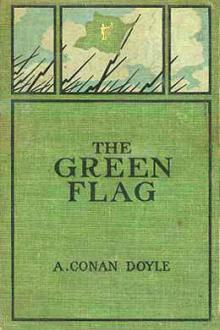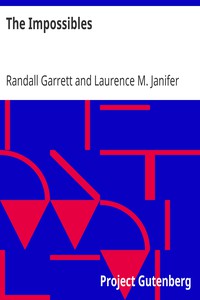That Sweet Little Old Lady, Randall Garrett and Laurence M. Janifer [books to read for self improvement txt] 📗

Book online «That Sweet Little Old Lady, Randall Garrett and Laurence M. Janifer [books to read for self improvement txt] 📗». Author Randall Garrett and Laurence M. Janifer
"I'll bet it is," Malone said sympathetically, wishing he understood what Dr. O'Connor was talking about.
The telepathy expert sighed. "However," he said, "we keep working at it." Then he looked at Malone expectantly.
Malone shrugged. "Well, if I can't carry the thing around, I guess that's that," he said. "But here's the next question: Do you happen to know the maximum range of a telepath? I mean: How far away can he get from another person and still read his mind?"
Dr. O'Connor frowned again. "We don't have definite information on that, I'm afraid," he said. "Poor little Charlie was rather difficult to work with. He was mentally incapable of co-operating in any way, you see."
"Little Charlie?"
"Charles O'Neill was the name of the telepath we worked with," Dr. O'Connor explained.
"I remember," Malone said. The name had been on one of the tapes, but he just hadn't associated "Charles O'Neill" with "Little Charlie." He felt as if he'd been caught with his homework undone. "How did you manage to find him, anyway?" he said. Maybe, if he knew how Westinghouse had found their imbecile-telepath, he'd have some kind of clue that would enable him to find one, too. Anyhow, it was worth a try.
"It wasn't difficult in Charlie's case," Dr. O'Connor said. He smiled. "The child babbled all the time, you see."
"You mean he talked about being a telepath?"
Dr. O'Connor shook his head impatiently. "No," he said. "Not at all. I mean that he babbled. Literally. Here: I've got a sample recording in my files." He got up from his chair and went to the tall gray filing cabinet that hid in a far corner of the pine-paneled room. From a drawer he extracted a spool of common audio tape, and returned to his desk.
"I'm sorry we didn't get full video on this," he said, "but we didn't feel it was necessary." He opened a panel in the upper surface of the desk, and slipped the spool in. "If you like, there are other tapes—"
"Maybe later," Malone said.
Dr. O'Connor nodded and pressed the playback switch at the side of the great desk. For a second the room was silent.
Then there was the hiss of empty tape, and a brisk masculine voice that overrode it:
"Westinghouse Laboratories," it said, "sixteen April nineteen-seventy. Dr. Walker speaking. The voice you are about to hear belongs to Charles O'Neill: chronological age fourteen years, three months; mental age, approximately five years. Further data on this case will be found in the file O'Neill."
There was a slight pause, filled with more tape hiss.
Then the voice began.
"... push the switch for record ... in the park last Wednesday ... and perhaps a different set of ... poor kid never makes any sense in ... trees and leaves all sunny with the ... electronic components of the reducing stage might be ... not as predictable when others are around but ... to go with Sally some night in the...."
It was a childish, alto voice, gabbling in a monotone. A phrase would be spoken, the voice would hesitate for just an instant, and then another, totally disconnected phrase would come. The enunciation and pronunciation would vary from phrase to phrase, but the tone remained essentially the same, drained of all emotional content.
"... in receiving psychocerebral impulses there isn't any ... nonsense and nothing but nonsense all the ... tomorrow or maybe Saturday with the girl ... tube might be replaceable only if ... something ought to be done for the ... Saturday would be a good time for ... work on the schematics tonight if...."
There was a click as the tape was turned off, and Dr. O'Connor looked up.
"It doesn't make much sense," Malone said. "But the kid sure has a hell of a vocabulary for an imbecile."
"Vocabulary?" Dr. O'Connor said softly.
"That's right," Malone said. "Where'd an imbecile get words like 'psychocerebral'? I don't think I know what that means, myself."
"Ah," Dr. O'Connor said. "But that's not his vocabulary, you see. What Charlie is doing is simply repeating the thoughts of those around him. He jumps from mind to mind, simply repeating whatever he receives." His face assumed the expression of a man remembering a bad taste in his mouth. "That's how we found him out, Mr. Malone," he said. "It's rather startling to look at a blithering idiot and have him suddenly repeat the very thought that's in your mind."
Malone nodded unhappily. It didn't seem as if O'Connor's information was going to be a lot of help as far as catching a telepath was concerned. An imbecile, apparently, would give himself away if he were a telepath. But nobody else seemed to be likely to do that. And imbeciles didn't look like very good material for catching spies with.
Then he brightened. "Is it possible that the spy we're looking for really isn't a spy?"
"Eh?"
"I mean, suppose he's an imbecile, too? I doubt whether an imbecile would really be a spy, if you see what I mean."
Dr. O'Connor appeared to consider the notion. After a little while he said: "It is, I suppose, possible. But the readings on the machine don't give us the same timing as they did in Charlie's case—or even the same sort of timing."
"I don't quite follow you," Malone said. Truthfully, he felt about three miles behind. But perhaps everything would clear up soon. He hoped so. On top of everything else, his feet were now hurting a lot more.
"Perhaps if I describe one of the tests we ran," Dr. O'Connor said, "things will be somewhat clearer." He leaned back in his chair. Malone shifted his feet again and transferred his hat from his right hand to his left hand.
"We put one of our test subjects in the insulated room," Dr. O'Connor said, "and connected him to the detector. He was to read from a book—a book that was not too common. This was, of course, to obviate the chance that some other person nearby might be reading it, or might have read it in the past. We picked 'The Blood is the Death,' by Hieronymus Melanchthon, which, as you may know, is a very rare book indeed."
"Sure," Malone said. He had never heard of the book, but he was, after all, willing to take Dr. O'Connor's word for it.
The telepathy expert went on: "Our test subject read it carefully, scanning rather than skimming. Cameras recorded the movements of his eyes in order for us to tell just what he was reading at any given moment, in order to correlate what was going on in his mind with the reactions of the machine's indicators, if you follow me."
Malone nodded helplessly.
"At the same time," Dr. O'Connor continued blithely, "we had Charlie in a nearby room, recording his babblings. Every so often, he would come out with quotations from 'The Blood is the Death,' and these quotations corresponded exactly with what our test subject was reading at the time, and also corresponded with the abnormal fluctuations of the detector."
Dr. O'Connor paused. Something, Malone realized, was expected of him. He thought of several responses and chose one. "I see," he said.
"But the important thing here," Dr. O'Connor said, "is the timing. You see, Charlie was incapable of continued concentration. He could not keep his mind focused on another mind for very long, before he hopped to still another. The actual amount of time concentrated on any given mind at any single given period varied from a minimum of one point three seconds to a maximum of two point six. The timing samples, when plotted graphically over a period of several months, formed a skewed bell curve with a mode at two point oh seconds."
"Ah," Malone said, wondering if a skewed bell curve was the same thing as a belled skew curve, and if not, why not?
"It was, in fact," Dr. O'Connor continued relentlessly, "a sudden variation in those timings which convinced us that there was another telepath somewhere in the vicinity. We were conducting a second set of reading experiments, in precisely the same manner as the first set, and, for the first part of the experiment, our figures were substantially the same. But—" He stopped.
"Yes?" Malone said, shifting his feet and trying to take some weight off his left foot by standing on his right leg. Then he stood on his left leg. It didn't seem to do any good.
"I should explain," Dr. O'Connor said, "that we were conducting this series with a new set of test subjects: some of the scientists here at Yucca Flats. We wanted to see if the intelligence quotients of the subjects affected the time of contact which Charlie was able to maintain. Naturally, we picked the men here with the highest IQ's, the two men we have who are in the top echelon of the creative genius class." He cleared his throat. "I did not include myself, of course, since I wished to remain an impartial observer, as much as possible."
"Of course," Malone said without surprise.
"The other two geniuses," Dr. O'Connor said, "happen to be connected with the project known as Project Isle—an operation whose function I neither know, nor care to know, anything at all about."
Malone nodded. Project Isle was the non-rocket spaceship. Classified. Top Secret. Ultra-Secret. And, he thought, just about anything else you could think of.
"At first," Dr. O'Connor was saying, "our detector recorded the time periods of ... ah mental invasion as being the same as before. Then, one day, anomalies began to appear. The detector showed that the minds of our subjects were being held for as long as two or three minutes. But the phrases repeated by Charlie during these periods showed that his own contact time remained the same; that is, they fell within the same skewed bell curve as before, and the mode remained constant if nothing but the phrase length were recorded."
"Hm-m-m," Malone said, feeling that he ought to be saying something.
Dr. O'Connor didn't notice him. "At first we thought of errors in the detector machine," he went on. "That worried us not somewhat, since our understanding of the detector is definitely limited at this time. We do feel that it would be possible to replace some of the electronic components with appropriate symbolization like that already used in the purely psionic sections, but we have, as yet, been unable to determine exactly which electronic components must be replaced by what symbolic components."
Malone nodded, silently this time. He had the sudden feeling that Dr. O'Connor's flow of words had broken itself up into a vast sea of alphabet soup, and that he, Malone, was occupied in drowning in it.
"However," Dr. O'Connor said, breaking what was left of Malone's train of thought, "young Charlie died soon thereafter, and we decided to go on checking the machine. It was during this period that we found someone else reading the minds of our test subjects—sometimes for a few seconds, sometimes for several minutes."
"Aha," Malone said. Things were beginning to make sense again. Someone else. That, of course, was the spy.
"I found," Dr. O'Connor said, "on interrogating the subjects more closely, that they were, in effect, thinking on two levels. They were reading the book mechanically, noting the words and sense, but simply shuttling the material directly into their memories without actually thinking about it. The actual thinking portions of their minds were concentrating on aspects of Project Isle."
"In other words," Malone said, "someone was spying on them for information about Project Isle?"
"Precisely," Dr. O'Connor said with a frosty, teacher-to-student smile. "And whoever it was had a much higher concentration time than Charlie had ever attained. He seems to be able to retain contact as long as he can find useful information flowing in the mind being read."
"Wait a minute," Malone said. "Wait a minute. If this spy is so clever, how come he didn't read your mind?"
"It is very likely that he has," O'Connor said. "What does that have to do with it?"
"Well," Malone said, "if he knows you and your group are working on telepathy and can detect what he's doing, why didn't he just hold off on the minds of those geniuses when they were being tested in your machine?"
Dr. O'Connor frowned. "I'm afraid that I can't be sure," he said, and it was clear from his tone that, if Dr. Thomas O'Connor wasn't sure, no one in the entire world was, had been, or ever would be. "I do have a theory, however," he said, brightening up a trifle.
Malone waited patiently.
"He must know our limitations," Dr. O'Connor said at last. "He must be perfectly well aware that there's not a single thing we can do about him. He must know that we can neither find nor stop him. Why should he worry? He can afford to ignore us—or even bait us. We're helpless, and he knows it."
That, Malone thought, was about the most cheerless thought he had heard in some time.
"You mentioned that you had an insulated room," the FBI agent said after a while. "Couldn't you let your men think in there?"
Dr. O'Connor sighed. "The room is shielded against magnetic fields and electromagnetic radiation. It is perfectly transparent to psionic phenomena, just as it is to gravitational fields."
"Oh," Malone said. He realized rapidly that his question had been a little silly to begin with, since the insulated room had been the place where all the tests had been conducted in the first place. "I don't want to take up too much of your time, doctor," he said after a pause, "but there are a couple of other questions."
"Go right ahead," Dr. O'Connor said. "I'm sure I'll be able to help you."
Malone thought of mentioning how little help the doctor had been to date, but decided against it. Why antagonize a perfectly good scientist without any reason? Instead, he selected his first question, and asked it. "Have you got any idea how we might lay our hands on another telepath? Preferably one that's not an imbecile, of course."
Dr. O Connor's expression changed from patient wisdom to irritation. "I wish we could, Mr. Malone. I wish we





Comments (0)